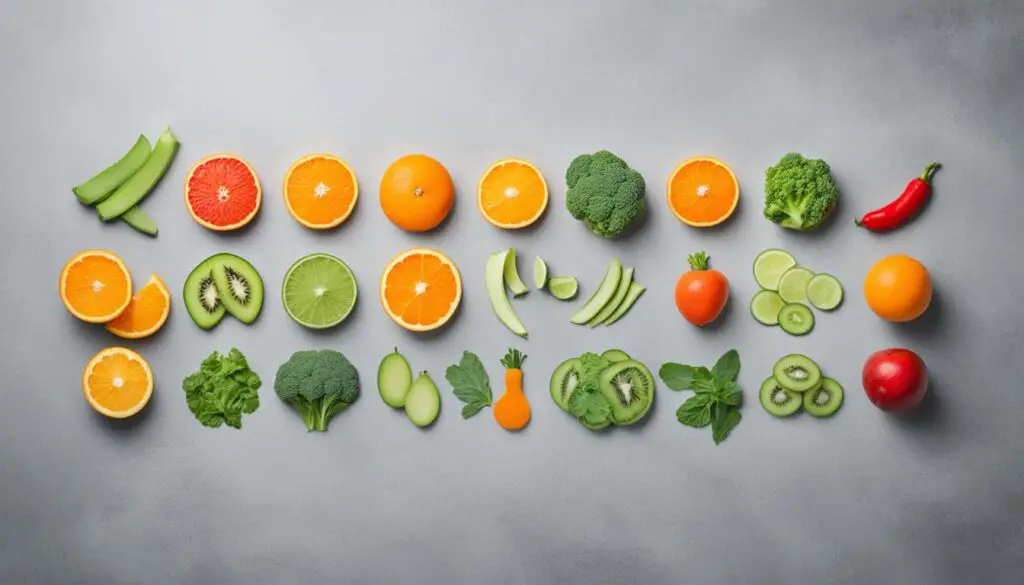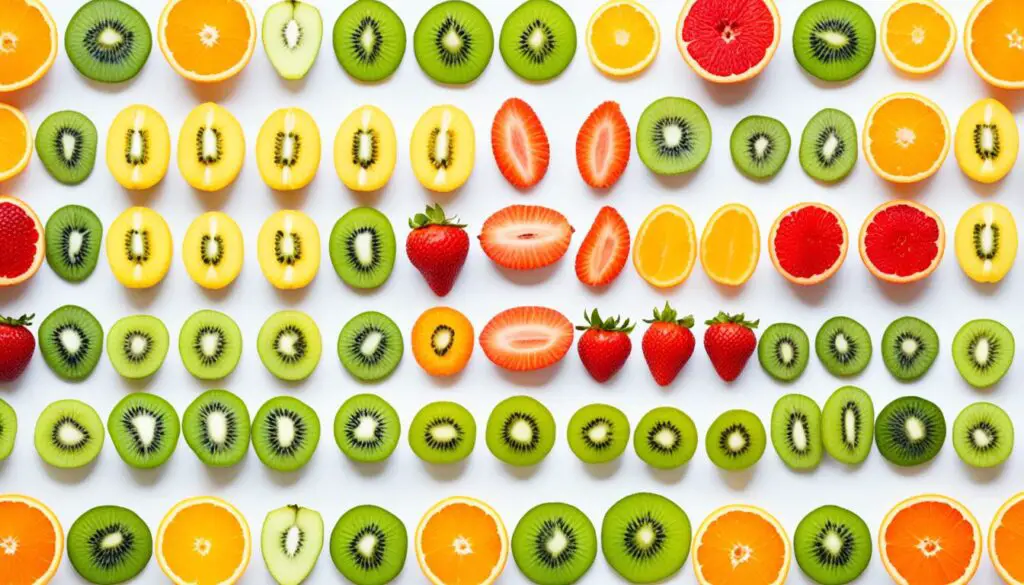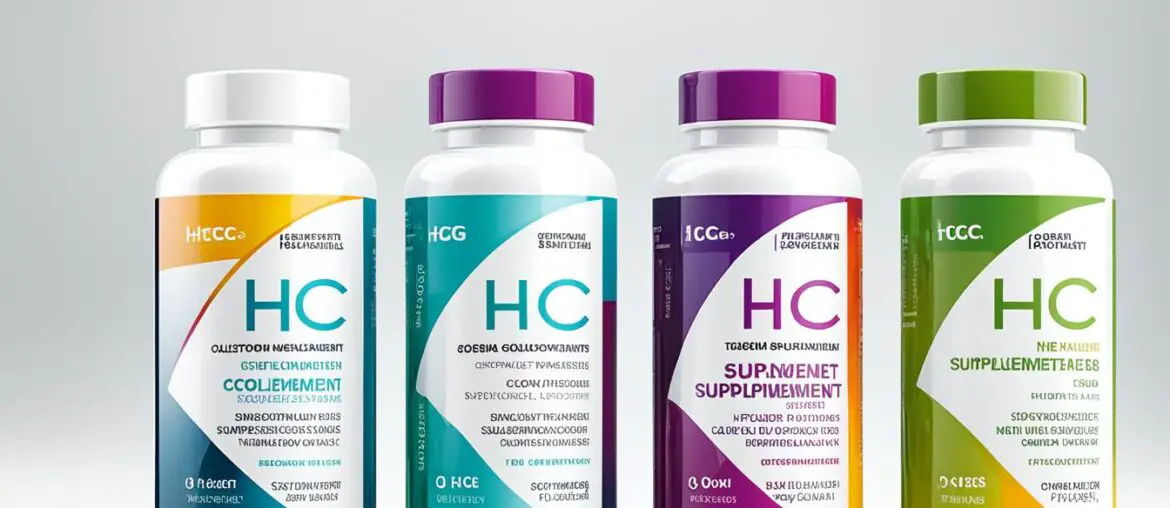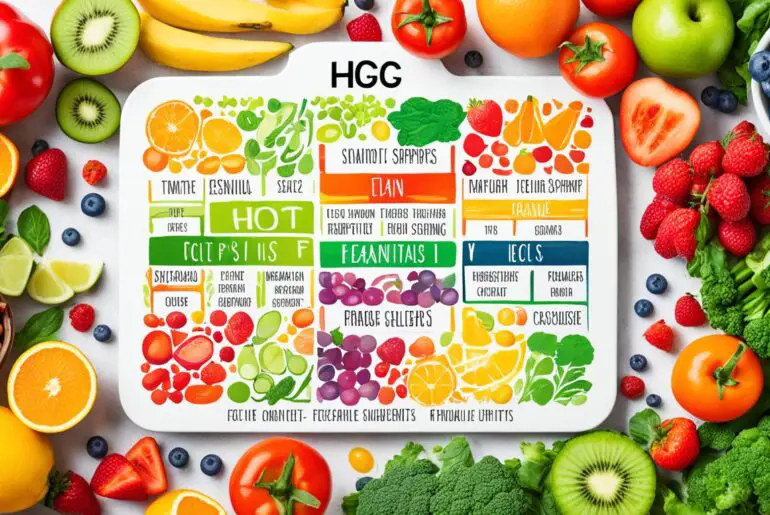Did you know that the HCG Diet is one of the most popular weight loss protocols with millions of followers worldwide? This unique diet combines a low-calorie intake with the HCG hormone to promote rapid weight loss. But what about supplements? Are they necessary or even allowed during the HCG Diet? In this article, I will provide you with my top supplement recommendations for HCG dieters, ensuring you have all the information you need to support your weight loss journey and achieve your goals.
Key Takeaways:
- Supplements are generally not recommended during the 500-calorie phase of the HCG Diet.
- Dr. Simeons, the creator of the HCG Diet, stated that the body receives necessary nutrition from the stored fat during this phase.
- However, once the HCG phase is completed, you can resume taking vitamins.
- Some exceptions include vitamin C, vitamin D, and calcium in non-oily solutions.
- Vitamin B12 supplements may be beneficial for increasing energy levels, but check for added sugars or artificial flavors.
The Role of Vitamins on the HCG Diet
During the HCG Diet, the role of vitamins is significant in supporting overall health and wellness. However, it is important to note that vitamin supplementation is not recommended during the HCG phase due to its potential impact on weight loss.
The combination of the HCG hormone and restricted calorie intake provides the body with the necessary nutrients, including vitamins, to function optimally. Dr. Simeons, the creator of the HCG Diet, assured his patients that they would not experience significant protein deficiency or signs of vitamin deficiency while on the diet.
As a result, additional vitamin supplementation is not necessary and may even hinder progress on the HCG Diet. The focus during this phase should be on maximizing the benefits of the HCG hormone and following the prescribed eating plan to achieve weight loss goals.
However, once the HCG phase is completed and the 72-hour waiting period is over, it is safe to resume taking vitamins to support overall health and wellness. At this stage, vitamins can play a vital role in replenishing any potential deficiencies and ensuring proper nutrition.
It is important to choose high-quality vitamin supplements that are appropriate for your specific needs and compatible with the HCG protocol. Consult with a healthcare professional or a registered dietitian to determine the best vitamin regimen for your post-HCG journey.
Remember, maintaining a balanced diet and incorporating a variety of nutrient-rich foods is essential to support optimal health while on the HCG Diet and beyond.
Benefits of Vitamins on the HCG Diet:
- Support overall health and wellness
- Replenish potential vitamin deficiencies
- Aid in proper nutrition post-HCG phase
- Boost energy levels
- Enhance immune function
- Promote hair, skin, and nail health
| Vitamins | Recommended Dosage | Benefits |
|---|---|---|
| Vitamin C | 500mg-1,000mg daily | Boosts immune system, supports collagen production |
| Vitamin D | 1,000IU-2,000IU daily | Supports bone health, aids in calcium absorption |
| B Vitamins (B12, B6) | Varies based on individual needs | Enhances energy levels, supports nervous system function |
| Calcium | 1,000mg-1,500mg daily | Supports bone health, aids in muscle function |
The HCG Diet and Vitamin Restrictions

When following the HCG Diet, it’s important to adhere to specific guidelines regarding vitamin supplementation. During the 500-calorie phase of the diet, it is advisable to minimize the intake of additional vitamins, with a few exceptions.
Vitamins C, D, and calcium are allowed during this phase but should be consumed only when necessary and in non-oily, non-capsule forms. It’s crucial to ensure that these vitamins don’t contain any additional ingredients or nutritional values that could hinder weight loss progress. Additionally, vitamin B12 in a homeopathic or HCG Diet-specific formulation is permissible.
Individual experiences may vary, and some individuals may find that certain vitamins cause stalls or weight gains while on the HCG Diet. If this is the case, it is recommended to discontinue using these vitamin supplements until reaching the maintenance phase of the diet.
Vitamin Guidelines during the HCG Diet
Below is a table outlining the recommended vitamins and their permissible forms during the 500-calorie phase of the HCG Diet:
| Vitamin | Permissible Forms |
|---|---|
| Vitamin C | Non-oily, non-capsule forms |
| Vitamin D | Non-oily, non-capsule forms |
| Calcium | Non-oily, non-capsule forms |
| Vitamin B12 | Homeopathic or HCG Diet-specific formulation |
It’s important to remember that these guidelines are specific to the 500-calorie phase and that individual needs may vary. Always consult with a healthcare professional or a qualified HCG Diet specialist before incorporating any additional vitamins or supplements into your diet regimen.
With these vitamin restrictions in mind, you can continue on your HCG Diet journey while ensuring you are following the appropriate guidelines for optimal results.
Do You Need Extra Vitamins on the HCG Diet?
It is not necessary to take extra vitamins while on the HCG Diet, as the HCG hormone and the restricted calorie intake provide the necessary nutrients for the body. Dr. Simeons reassured his patients that they would receive all the vitamins, minerals, and other essential nutrients from their stored fat and the food they consume. Taking additional vitamins may slow down weight loss progress and is not recommended. However, there are certain vitamins that may be allowed in limited quantities to address specific concerns.
Vitamins Allowed in Limited Quantities
While extra vitamins are generally discouraged on the HCG Diet, there are a few exceptions. Here are some vitamins that may be allowed in specific circumstances:
- Vitamin C: In limited quantities, vitamin C can be used to address tooth decay or support the immune system.
- Vitamin D: Limited quantities of vitamin D can be beneficial for individuals with low levels or those who cannot get enough sunlight exposure.
To ensure the best results on the HCG Diet, it is recommended to follow the program’s guidelines and consult with a healthcare provider before making any modifications to your supplement routine.
Vitamins and the HCG Diet: What is Permitted?
Although extra vitamin supplementation is generally discouraged on the HCG Diet, there are a few exceptions. Dr. Simeons permitted the use of vitamin C, vitamin D, and calcium during the HCG phase. These must be in non-oily solutions and should not contain any additional ingredients.
Vitamin B12, in a homeopathic or specifically formulated HCG Diet version, is also allowed and may help increase energy levels. It is important to check the ingredients of vitamin B12 supplements for added sugars and artificial flavors. Additionally, homeopathic cell salts may be used to alleviate leg or muscle cramps, but they should be purchased from a reputable source and must be homeopathic.
Vitamin Recommendations After the HCG Diet

After completing the HCG Diet, it is crucial to continue prioritizing proper nutrition to support your body’s overall health and wellness. Taking multivitamins daily can help ensure you receive all the necessary nutrients for your body’s regeneration and adjustment to a healthier lifestyle. It is also important to stay hydrated and be mindful of distinguishing between hunger and thirst. A balanced diet, rich in vitamins and minerals, is essential for maintaining optimal health.
Understanding the connection between the HCG Diet and ketosis can also help optimize your weight loss efforts. While on the HCG Diet, your body enters a state of ketosis, where it primarily relies on stored fat for energy. To support this process, certain supplements, such as magnesium, calcium, and vitamin D, can be safely included in your post-HCG diet supplementation regimen. These supplements do not interfere with ketosis and can help maintain your body’s nutrient balance.
To ensure you select the right vitamins for post-HCG diet supplementation, consult with a healthcare professional or a registered dietitian. They can provide personalized recommendations based on your specific needs and goals. Remember, proper nutrition is key to sustaining your weight loss and promoting overall well-being.
Achieving Optimal Health:
- Take daily multivitamins to provide your body with essential nutrients for regeneration.
- Stay hydrated and differentiate between hunger and thirst.
- Incorporate a balanced diet rich in vitamins and minerals.
- Consult with a healthcare professional for personalized vitamin recommendations.
“Proper nutrition plays a vital role in supporting overall health and maintaining weight loss after completing the HCG Diet. Focus on incorporating a balanced diet and supplementation to meet your body’s nutritional needs.”
After completing your HCG Diet journey, it’s important to prioritize your health and wellness by continuing to provide your body with the necessary vitamins and minerals it needs. By following the recommended vitamin supplementation protocols and maintaining a balanced diet, you can support your body’s regeneration, adjust to a healthier lifestyle, and sustain your weight loss success.
HCG Diet Results and Considerations
The HCG Diet is well-known for its remarkable weight loss results. Following the strict eating plan and protocol can lead to rapid and significant weight loss, with an average of 1 to 3 pounds per day. It is essential to understand and consider various factors when assessing the success of the HCG Diet and its sustainability for individual circumstances. Achieving long-term success on the HCG Diet requires careful considerations and a realistic approach.
Understanding HCG Diet Results
The success of the HCG Diet can be measured by the amount of weight lost during the protocol. Many individuals experience substantial weight loss, which can be motivating and encouraging. However, it is crucial to recognize that weight loss results may vary depending on several factors, including the starting weight, metabolic rate, adherence to the protocol, and overall health.
While some individuals may achieve rapid weight loss, it is important to remember that sustainable weight loss is gradual and requires a long-term commitment to healthy lifestyle choices. The HCG Diet can provide an initial boost to weight loss efforts, but maintaining the results over time requires ongoing dedication and a balanced approach to nutrition and exercise.
Considerations for Successful HCG Diet Results
When embarking on the HCG Diet, it is essential to consider the following factors:
- Consult with a healthcare provider: Before starting any weight loss program, it is crucial to consult with a healthcare provider to ensure it is safe and suitable for individual health conditions and medical history.
- Commitment to the protocol: The HCG Diet requires strict adherence to the prescribed eating plan and protocol. Following the guidelines and restrictions is crucial for achieving optimal results.
- Maintaining realistic expectations: While the HCG Diet can lead to significant weight loss, it is important to maintain realistic expectations and understand that sustainable weight loss is a gradual process.
- Long-term lifestyle changes: To maintain weight loss achieved through the HCG Diet, it is necessary to adopt long-term lifestyle changes, including healthy eating habits, regular physical activity, and healthy coping mechanisms for stress and emotional eating.
Ensuring Sustainable Weight Loss
While the HCG Diet can be effective for achieving initial weight loss, it is essential to focus on sustainable weight loss practices for long-term success. This includes:
- Eating a balanced and nutritious diet: Incorporate a variety of nutrient-dense foods, including lean proteins, fruits, vegetables, whole grains, and healthy fats.
- Regular physical activity: Engage in regular exercise, including cardiovascular activities, strength training, and flexibility exercises, to support weight management and overall health.
- Developing healthy habits: Create sustainable habits that promote a healthy lifestyle, such as mindful eating, portion control, stress management, and adequate sleep.
- Monitoring progress: Keep track of progress by regularly weighing yourself, measuring body composition, and assessing overall well-being. Regular check-ins with a healthcare provider or weight loss coach can provide additional support and accountability.
By incorporating these considerations and practices into daily life, individuals can achieve sustainable weight loss and maintain their results over time. Remember, weight loss is a journey, and each individual’s path is unique. It is important to prioritize health and well-being throughout the process.
| Factors | Description |
|---|---|
| Starting weight | The initial weight before starting the HCG Diet can influence the overall weight loss results. |
| Adherence to the protocol | Strictly following the HCG Diet eating plan and protocol is essential for successful outcomes. |
| Overall health | The individual’s overall health, including medical conditions and medications, can impact the response to the HCG Diet. |
| Lifestyle changes | Adopting long-term healthy habits, such as regular exercise and balanced nutrition, can contribute to sustainable weight loss. |
| Support and accountability | Having a support system, such as a healthcare provider or weight loss coach, can provide guidance and motivation throughout the HCG Diet journey. |
| Mindset and motivation | A positive mindset and motivation are essential for overcoming challenges and staying committed to the HCG Diet. |
Conclusion
In conclusion, the HCG Diet emphasizes minimizing vitamin supplementation to optimize weight loss results. During the HCG phase, the hormone and restricted calorie intake provide the necessary nutrition for the body. While additional vitamin supplements are generally discouraged, there are exceptions for vitamin C, vitamin D, and calcium in specific circumstances.
Once the HCG phase is completed, it is crucial to resume vitamin supplementation to support overall wellness. Consulting with a healthcare provider before starting any diet or supplement regimen is highly recommended to ensure personalized guidance.
Remember, the HCG Diet is a structured weight loss program that can yield rapid results. However, individual outcomes may vary based on factors such as adherence to the protocol, starting weight, and overall health. It is important to maintain realistic expectations and prioritize safe and sustainable weight loss practices.
Incorporating a balanced diet, staying hydrated, and understanding the connection between the HCG Diet and ketosis can further optimize weight loss efforts. By following the recommended guidelines and seeking guidance from healthcare professionals, individuals can achieve their weight loss goals effectively and maintain overall wellness.
FAQ
Can I take extra vitamins while on the HCG Diet?
It is generally not recommended to take extra vitamins while on the HCG Diet. The HCG hormone and restricted calorie intake provide the necessary nutrients for the body during this phase. However, there are a few exceptions, such as vitamin C, vitamin D, and calcium, which can be taken in specific circumstances.
Why are vitamins not recommended during the 500-calorie phase of the HCG Diet?
Vitamins are not recommended during the 500-calorie phase of the HCG Diet because they often contain calories, sugars, starches, and oils that can hinder weight loss. The body receives the necessary vitamins, proteins, and minerals from the fat as it is being lost.
When can I resume taking vitamins after completing the HCG phase?
After completing the HCG phase and completing the 72-hour waiting period, you can resume taking vitamins to support overall health and wellness.
Are there any vitamins allowed during the HCG phase?
Calcium and vitamin D are allowed during the HCG phase if in a non-oily solution, and vitamin C is permitted in large doses combined with an antihistamine for head colds. Vitamin B12 supplements may also be beneficial for increasing energy levels, but it is important to check the ingredients for any added sugars or artificial flavors.
Should I avoid vitamin supplementation after completing the HCG Diet?
No, it is important to resume vitamin supplementation after completing the HCG Diet to maintain proper nutrition and support the body’s overall health and wellness. Taking multivitamins daily can help provide the necessary nutrients for the body’s regeneration and adjustment to a healthy lifestyle.
Can I take other supplements during the HCG Diet?
It is generally recommended to minimize supplement intake during the HCG Diet to ensure optimal weight loss results. However, there may be specific circumstances where certain supplements, such as homeopathic cell salts, can be used to alleviate symptoms like leg or muscle cramps.
What should I consider before starting the HCG Diet?
Before starting the HCG Diet, it is important to consult with a healthcare provider to ensure it is safe and suitable for your individual circumstances. Factors such as starting weight, adherence to the protocol, and overall health should be taken into consideration for realistic expectations and effective weight loss.




